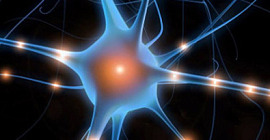Researchers have devised a gene transfer technique in mice that, with a single injection, protects the immune cells that HIV targets. With further development, the approach may prove effective at helping to prevent HIV infection in people.
Most vaccines work by triggering the immune system to produce antibodies to help beat back infections. But a vaccine for HIV has been elusive. Proteins on the surface of HIV mutate rapidly, changing shape and preventing most antibodies from latching onto the virus.
Scientists have discovered several antibodies that can neutralize HIV. They've gained important insights into how they bind to the virus and why they're effective. But designing a vaccine that prompts the human immune system to generate such antibodies and mount an effective attack remains a difficult challenge.
A team of researchers led by Drs. Alejandro Balazs and David Baltimore at the California Institute of Technology decided to pursue a different strategy—one that doesn't require the immune system to generate antibodies. Their work was partly supported by NIH's National Institute of Allergy and Infectious Disease (NIAID). Nature.
The scientists began with a virus capable of expressing high levels of full-length human antibodies when injected into muscle. They modified the virus by inserting the genes that code for an HIV-neutralizing antibody called b12. When the virus was injected into mouse leg muscle, the mice produced high levels of antibodies for at least a year.
Get The Latest By Email
The researchers next tested whether the technique could protect against HIV. Mice aren't susceptible to HIV, so the researchers used specialized mice with human CD4 cells, the immune cells that HIV targets and infects. After exposure to the virus, mice expressing b12 antibodies showed none of the CD4 cell loss that control animals did.
The researchers tested other antibodies known to neutralize a broad range of HIV strains. Another antibody called VRC01, which was identified by scientists at NIH, produced results similar to b12. Both antibodies protected CD4 cells against HIV doses 100-fold higher than the levels that would infect most animals. This protection would be well beyond that needed to prevent HIV infection in humans.
into the body, and the immune system figures out how to make an antibody against it,” Balazs explains. We've taken that whole part out of the equation.
The team is now developing a plan to test the method in human clinical trials. If humans are like mice, then we have devised a way to protect against the transmission of HIV from person to person,” says Baltimore. and so the next step is to try to find out whether humans behave like mice. by Harrison Wein, Ph. D.
http://www. nih. gov/researchmatters/december2009/12072009hiv.
http://www. nih. gov/researchmatters/august2011/08292011hiv.
http://www. nih. gov/researchmatters/july2010/07192010antibodies.
http://www. nih. gov/researchmatters/february2007/02262007vaccine.
http://www. aidsinfo. nih.
Article Source:
http://www.nih.gov/researchmatters/december2011/12122011hiv.htm










